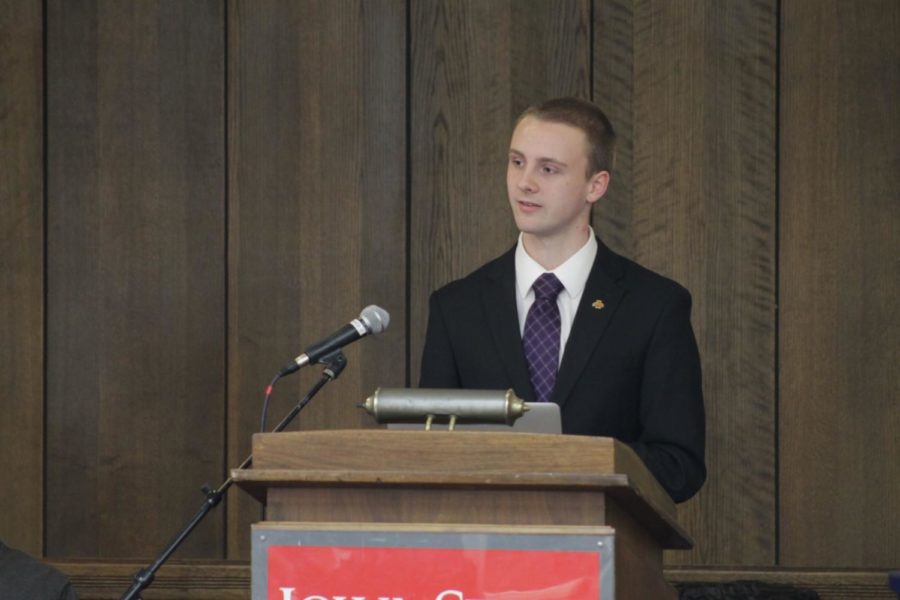GSB discusses bowling, elections and enrollment growth
Senator Cole Button from GSB explains his point regarding the topic of Buck Bowling in the Underground during the GSB meeting on Nov. 19.
November 20, 2014
Bowling prices and upcoming elections were the main topics discussed at the Government of the Student Body’s regular Senate meeting Wednesday night.
Sen. Cole Button proposed a bill—which later failed—that would fund $13,000 to the Underground Bowling to extend Buck Bowling Day throughout the semester. A game costs $1 on Sundays and Mondays. Button proposed having Buck Bowling seven days a week throughout the entire spring semester as a trial period. Shoe rental and one game would each cost $1.
Button acknowledged there would be a loss in profits for Underground Bowling, but the loss would not be significant. The Underground agreed they would be willing to take the chance because of the 6,000 students who consistently use the facility who would benefit.
Some senators disagreed with the idea, saying that it would be a loss of money to fund something unsustainable.
“We’re going to put $13,000 in to something that they’re going to lose money on. This is a one semester thing. I just don’t see the point,” said Sen. Abbie Lang.
Button said that when he wrote the bill, he was thinking of enhancing students’ experience at Iowa State and the fact that Underground Bowling agreed to the conditions, meant it had a chance.
Some senators thought $13,000 was too much money to spend on a semester-long trial period, and that a smaller portion for a shorter trial period would be a better idea.
George Micalone, assistant director for the Memorial Union, said the only way the Underground could take on the idea would be to do it all semester. The bill failed after votes.
Election Commissioner Alex Rodgers also spoke to the senate about upcoming GSB elections, which take place during the first half of the spring semester.
Sen. Danielle Nygard proposed an amendment that would change the number of senator positions open for election from 44 to 50 seats. As it has been planned this year, there is one senator to represent 1,500 students. Some positions do not have 1,500 students to represent, but a senator will still need to be on that seat. She recommended adding seats to select positions in order to reflect growth while keeping the scale of senators to students.
Sen. Khayree Fitten said it is GSB’s job to expand senators, but he said an increase of senators would hinder the efficiency of Senate meetings.
The bill and amendment were tabled and will be discussed at next week’s meeting.
The election timeline was also proposed, and Fitten proposed an amendment to do away with the election kick off date scheduled for Jan. 29, which says candidates who begin campaigning before that date will be given a fine.
Fitten said it was “fundamentally unconstitutional” and a strike against free speech to fine candidates who may even speak about running or announce candidacy before their date. Fitten said a large portion of GSB knows who has intentions of running or has decided to run by October or November.
The amendment was passed and the kick off date was struck from the timeline.
Coverage after press time (10:15 p.m.):
GSB also made three recommendations to give to the administration on enrollment growth.
Senators discussed recommendations they would present to the administration and President Steven Leath on short term plans that need to be made to tackle problems brought by enrollment growth. While the problems would require long-term planning also, they said short-term solutions need to be started.
The first plan centered on recommendations to expand hours and staff for Thielen Student Health Center. The entire student body would benefit from more accessible health care because there is currently too high of a deman.
When students are not able to get the care they need, it becomes a physical and academic problem because it affects their classwork and attendance, senators said. They also recommend an increase in the facility space.
The second recommendation focused on an increase in online testing centers. Along with that, they asked for limitations for classes that use the testing centers and a testing matrix that would provide a set schedule for the tests taken at certain times.
Senators then discussed different possibilities for the third recommendation including changing the way the university recruits students so there are not as many students coming in to the university, and the ones that do come will be more academically stable.
Other suggestions included adding a student leadership facility to the west side of the MU to provide student organizations with more meeting space.
Some senators said these suggestions were too grandiose, and would not affect the entire student body.
They said asking the university to consider a parking ramp or bike lanes to alleviate the heavy traffic on Osborn Dr. was a better option.
Some said a parking ramp that would open an additional 700 spots would not be feasible due to the buildings located around the area, and that they are not sure if the area can support such a structure.
The Senate decided to ask the university to continue to investigate alleviation of traffic on Osborn and to continue to search for solution to the lack of parking.







